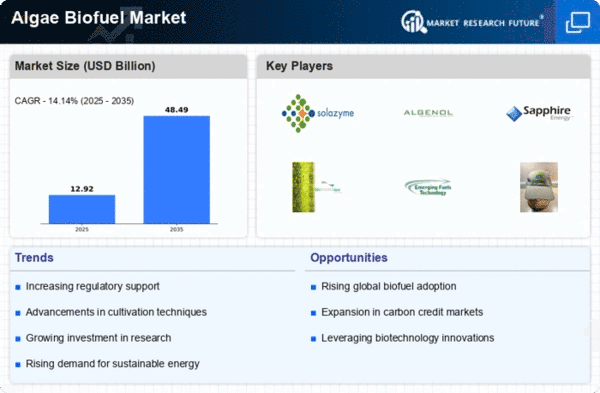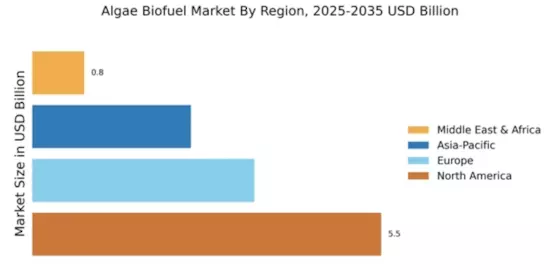Market Growth Projections
The Global Algae Biofuel Market Industry is poised for substantial growth, with projections indicating a market size of 11.3 USD Billion in 2024 and an anticipated increase to 48.5 USD Billion by 2035. This growth trajectory suggests a compound annual growth rate of 14.14% from 2025 to 2035. Such figures reflect the increasing recognition of algae biofuels as a viable alternative to traditional fossil fuels. The market's expansion is likely driven by a combination of technological advancements, supportive government policies, and rising consumer demand for sustainable energy solutions. This positive outlook underscores the potential for algae biofuels to play a pivotal role in the future of global energy.
Government Incentives and Policies
Government incentives and supportive policies play a crucial role in shaping the Global Algae Biofuel Market Industry. Many countries are implementing subsidies, tax breaks, and research funding to encourage the development of renewable energy technologies, including algae biofuels. These initiatives are designed to reduce dependency on fossil fuels and promote sustainable energy practices. For example, various nations have set ambitious targets for biofuel production, which could lead to increased investments in algae biofuel projects. This supportive regulatory environment is likely to foster innovation and growth within the industry, potentially driving the market towards a compound annual growth rate of 14.14% from 2025 to 2035.
Rising Demand for Renewable Energy
The Global Algae Biofuel Market Industry is experiencing a surge in demand for renewable energy sources as countries strive to meet their climate goals. With global energy consumption projected to increase, algae biofuels offer a sustainable alternative to fossil fuels. This shift is driven by government policies promoting clean energy and reducing greenhouse gas emissions. For instance, the global algae biofuel market is expected to reach 11.3 USD Billion in 2024, reflecting a growing recognition of the need for sustainable energy solutions. This trend indicates a robust market potential for algae biofuels, as they align with global efforts to transition towards greener energy sources.
Diverse Applications of Algae Biofuels
The versatility of algae biofuels is a significant driver for the Global Algae Biofuel Market Industry. Algae can be converted into various forms of biofuels, including biodiesel, bioethanol, and biogas, catering to different energy needs across multiple sectors. This adaptability allows for a broader market reach and the potential for integration into existing energy infrastructures. As industries seek to diversify their energy sources and reduce carbon footprints, algae biofuels present a compelling option. The growing interest in sustainable energy solutions across transportation, aviation, and power generation sectors is likely to propel the market forward, enhancing its relevance in the global energy landscape.
Environmental Benefits and Sustainability
The Global Algae Biofuel Market Industry is increasingly recognized for its environmental benefits, particularly in carbon sequestration and waste reduction. Algae can absorb carbon dioxide and other pollutants, making them an effective tool for mitigating climate change. Furthermore, algae biofuels can be produced using non-arable land and wastewater, which minimizes competition with food crops. This sustainable approach not only addresses energy needs but also contributes to environmental conservation. As awareness of these benefits grows, the demand for algae biofuels is expected to rise, positioning the industry as a key player in the global transition towards sustainable energy solutions.
Technological Advancements in Algae Cultivation
Algae Biofuel Market Recent Innovations in algae cultivation and processing technologies are significantly enhancing the efficiency and viability of the Global Algae Biofuel Market Industry. Techniques such as genetic engineering and improved photobioreactor designs are enabling higher yields and lower production costs. These advancements not only increase the economic feasibility of algae biofuels but also contribute to their scalability. As a result, the market is likely to witness accelerated growth, with projections indicating a market size of 48.5 USD Billion by 2035. This technological evolution suggests that algae biofuels could become a mainstream energy source, further solidifying their role in the renewable energy landscape. Significant Algae Biofuel Market growth is expected as artificial intelligence begins to automate bioreactor environments, allowing for real-time adjustments to light and nutrient levels to maximize lipid production.


















